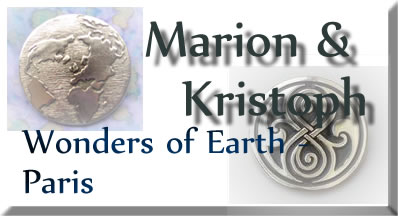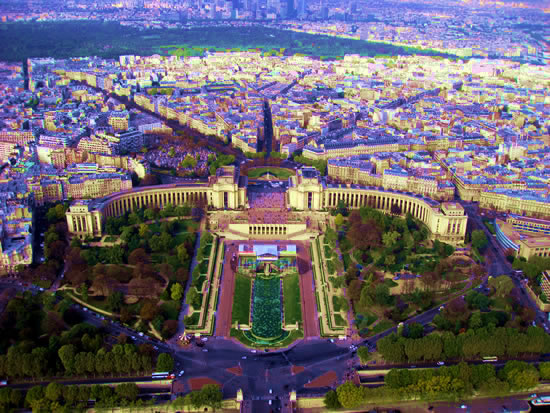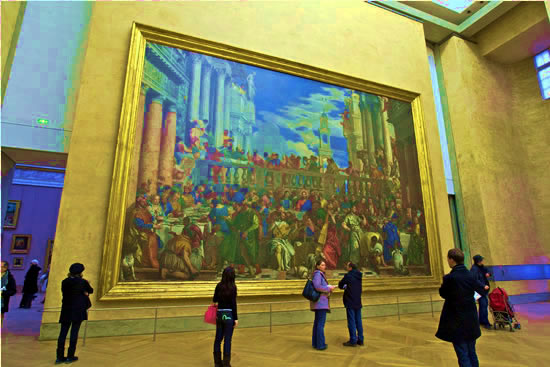

Aineytta de Lœngbærrow looked out over the city of Paris from the viewing gallery of the Eiffel Tower. Far below her was the long green expanse called the Champ du Mars, with the impressive edifice of the École Militaire looking like a very elaborate doll’s house at the far end. The linear park had been laid out, she had learned, in imitation of a similar place in the city of Rome some thousand years before, and was intended as a place where the army of Napoleon Bonaparte would parade in demonstration of their strength and prowess.
The concept was alien to her. Gallifrey had its defensive military force by necessity in a galaxy of aggressors, but nobody saw any reason to parade and glorify war.
The Champs du Mars was not being used for such glorification, now. It was a place for picnics and games on a warm summer afternoon.
Picnics were not especially Gallifreyan, either, and even if they were, she felt sure they wouldn’t happen in the middle of the Capitol.
Something within her evinced a deep sigh. It was noted by her son who came to her side.
“Magnificent view, isn’t it,” he said.
“It is a truly magnificent city,” Aineytta agreed. “It is the fourth magnificent city we have seen in as many weeks. Rome, Barcelona, New York….”
She was quiet for a long moment. Kristoph let her decide when she was ready to explain her melancholy.
“Hubris,” she said after a while.
“Hubris?” Kristoph echoed, wondering what he should infer from one single word.
“Yes, hubris. I may have been born a lowly Caretaker, but I was still raised in the knowledge that we were the greatest people in the known galaxy, that our Capitol was the epitome of architectural magnificence, our creative accomplishments unparalleled….”
“The Capitol is a beautiful city,” Kristoph agreed, still not sure where the conversation was going. He glanced around to see Marion at the souvenir stand looking at postcards and die cast models of the Tower. She would be a little while, yet.
“Yes,” Aineytta continued. “But look around us. Here is a city twice as big as the Capitol with many buildings just as remarkable. This tower… built by men with tools in their hands, without any anti-grav technology to lift the huge metal girders. And I am told this isn’t even the tallest building on this planet. Marion wasn’t even sure which WAS the tallest. Apparently there are so many new structures that the accolade changes decade on decade.”
“The Burj Khalifa in Dubai is the current record holder,” Kristoph told her. “Though I must say it doesn’t impress me much. Tall buildings in a desert city are just a bit TOO much like the Capitol. That’s why it isn’t on our itinerary. As for the Eiffel Tower, it has certainly been overshadowed by history since it was new. Counting free standing structures rather than ‘buildings’ in the strictest sense, there are currently twenty-five towers that are considerably higher than the one we are standing upon right now.”
“That’s just what I mean. The soaring ambition of these Humans. And not just architecturally. Look at their artistic achievements. We have three galleries on the whole of Gallifrey. There are more than three just within sight of this place… and countless more in this one city. Those other cities I mentioned have as many again. And those are just four of many great cities on Earth. How is it that humans, who we are told are less than us, can have achieved so much?”
“Limitless imagination,” Kristoph answered. “In that humans are superior to every other race in the cosmos.”
“Doesn’t it make you feel terribly humble… and a little foolish? We have convinced ourselves that we are such a great and noble people….”
“We DO have time and space at our command,” Kristoph reminded her. “I think that might be the basis of our claim to greatness.”
“Yes, I suppose that is something,” Aineytta conceded, then laughed at herself. “Take no notice of me. Despite these travels I have been too long at home on Gallifrey. I am quite untutored in the ways of other races.”
“At least you are learning. I fear too many of our people are complacent about their superiority. One day we may all feel that hubris.”
Out of the corner of his eye he saw Marion returning to them with a carrier back filled with her choice of souvenirs. He smiled brightly, dismissing those more earnest thoughts.
“A pewter Eiffel Tower model?” Kristoph commented with a sardonically raised eyebrow as he noted the shape within the carrier bag. “To be displayed alongside centuries old antiques in the main drawing room, no doubt?”
“To be displayed in my White drawing room along with the models of Blackpool Tower and the old New Brighton Tower,” Marion answered. “Apart from the pleasure they give me, many of my Gallifreyan friends enjoy seeing my souvenirs, but the great treasures of the House of Lœngbærrow are in no danger of being swamped by them.”
She was joking, as was he. She loved the priceless antiques collected by Kristoph’s forebears as much as her far less precious trinkets.
“What were you two talking about while I was busy, anyway?”
“How ingenious humans are with their great towers and magnificent art,” Aineytta answered truthfully.
“And I was saying that these are the reasons I love humans so much,” Kristoph added.
“I thought there was just the one particular Human that you were fond of,” Aineytta told her son. He laughed and put his hand on Marion’s.
“That makes their race even more unique,” Kristoph insisted.
“Which is your favourite of the art galleries we have seen?” Marion asked, changing the subject deftly. “We’ve seen some marvellous examples these past weeks.”
“Impossible to choose,” Aineytta answered her. “But I think the one we visited yesterday… the Louvre… was quite impressive. The building itself rivals the Citadel in size. It would take many days to properly see every work of art in there. We only had a single evening.”
“We can go again,” Kristoph suggested. “There are, indeed, many more fine works. But you have seen the most famous of them.”
“That portrait of a woman that was placed behind so much security. What was it called again…”
“The Mona Lisa.” Marion laughed. “You weren’t impressed by it, were you? Actually, the first time I saw it I was a bit underwhelmed, too. I think there is too much expectation, and too many crowds around it, even on an evening tour when the rest of the gallery is quiet.”
“I was not aware of any expectation,” Ainyetta admitted. “I didn’t know it was meant to be the most famous painting on your world. It did excite my curiosity a little, I admit. I felt sure I knew the scenery in the background. The portrait itself seemed unremarkable.”
“The scenery is familiar because it appears in the dining room at Mount Lœng House,” Kristoph told her. “We visited Da Vinci at his studio when Marion and I were betrothed. He insisted that she had the finest complexion he had ever seen and insisted on painting her portrait.”
“Renaissance women really had dreadful skin under their make-up,” Marion explained. “Most of them had chicken pox marks and blotches from bad nutrition. It really wasn’t hard to look better than that.”
“Leonardo was certainly impressed,” Kristoph confirmed. “Of course, I insisted on buying the finished result in order to avoid a paradox. It would not do for Marion to become the most famous face in history instead of Madame Gherardini.”
“I wonder if it would have been so famous in that case,” Marion debated. “I’m quite sure my smile is not ‘enigmatic’. Mostly when I was sitting for the portrait I just felt hot and itchy. There were midges coming in from the river through the open window. And there wasn’t even any need to have it open like thar. Leonardo had painted that same scenery for the Mona Lisa. He could have just done it from memory.”
“Maybe Madame Gherardini was hot and itchy, too,” Kristoph suggested. “Perhaps ‘Enigmatic’ is just a polite term for ‘thoroughly fed up’.”
Marion laughed and admitted it was worth the discomfort to be the subject of a Da Vinci portrait, even if no art critic on Earth would ever see it.
“Well, I still preferred the painting on the opposite wall,” Aineytta insisted when they ran out of things to say about the Mona Lisa. “That very big canvas.”
“The Wedding at Cana by Paolo Veronese,” Marion confirmed. “I like that one, too. I like that it tells a story. Jesus’ first miracle – turning the water into wine.”
“I am puzzled why that is a miracle,” Aineytta remarked. “Wine is MADE of water along with a few added ingredients. I used to make wine when I was young… before I could afford a cellar full of vintage bottles.”
“Yes, but even on Gallifrey it takes weeks for wine to ferment. The miracle was doing it instantly,” Marion explained.
“We can do it instantly on Gallifrey with a temporal manipulator,” Kristoph pointed out. “And walking on water is possible with a little psychic levitation. But I wouldn’t dismiss the miracles of Jesus too quickly. Divine works are out of bounds even to the Celestial Intervention Agency.”
“It’s actually a bit of a miracle that Wedding of Cana made it to the Louvre at all,” Marion said, deciding to move on from theological debate. “It had to be cut in half to transport it when Napoleon Bonaparte had it looted it fromits original home in Venice.”
“What a disgraceful thing to do to a work of art,” Aineytta said.
“It was, but the repair was very good. It looks perfect, now.”
“Well, it had to be,” Kristoph noted. “Bonaparte would not have been happy with a shoddy restoration, and he was not a man to cross that way.”
“You met him, of course!” Marion teased.
“I treated him for frostbite when he was crossing the Alps,” Kristoph answered. “Which brings me to another of the great Louvre treasures. David’s beautiful image of Napoleon on horseback leading his men on that campaign is pure fiction. He didn’t look anything like as heroic when I saw him rolled up in his bedding feeling sorry for himself.”
“Serves him right for misusing that marvellous painting,” Aineytta decided. “That really is Hubris.”
“Indeed,” Kristoph agreed. “Now, have we seen enough of the view from the Eiffel Tower? There is plenty more to see in Paris. There’s Montmartre and Notre Dame Cathedral, the Pompidou Centre, the Champs Elysses….”
“I think I’d like to see a nice Parisian pavement café selling croissants and lattés” Marion decided. “I need my second wind before any more tourism.”
“I second that,” Aineytta agreed.
Kristoph readily agreed, but neither his wife nor his mother noticed the doubt in his eyes.
Marion was tired already. But they had only been at the top of the tower for an hour. They had come straight here from the hotel by taxi.
Marion was getting tired too quickly in the past few days. It was starting to be a cause for concern.

 |
 |
 |